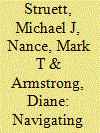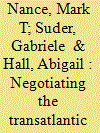|
|
|
Sort Order |
|
|
|
Items / Page
|
|
|
|
|
|
|
| Srl | Item |
| 1 |
ID:
117945


|
|
|
|
|
| Publication |
2013.
|
| Summary/Abstract |
Maritime piracy is one of the oldest subjects of international law and recently it has reemerged as a serious threat to commerce and security. While states have become more engaged in punishing and preventing piracy, efforts as a whole have been poorly organized, ad hoc, mostly unilateral, slow to develop, and only minimally effective. This is true despite the existence of a regime complex that supposedly promotes effective cooperation on the issue. What explains the insufficient response to this rising economic and security threat? This article argues that the regime complex itself is a major part of the problem. It examines specifically four core elemental regimes that are identifiable by their key texts or organizations: the UN Convention on the Law of the Sea, the Convention for the Suppression of Unlawful Acts Against the Safety of Maritime Navigation, the International Maritime Organization, and the International Maritime Bureau. This analysis adopts a perspective that emphasizes how these different legal and organizational institutions shape actors' understandings of piracy, and thus their interests in it, in conflicting ways. Different elemental regimes push different actors toward different behaviors.
|
|
|
|
|
|
|
|
|
|
|
|
|
|
|
|
| 2 |
ID:
146828


|
|
|
|
|
| Summary/Abstract |
This article analyzes the effectiveness of an international, interdisciplinary simulation of an ongoing trade negotiation. It thoroughly describes the simulation, provides links to background information for public use, and offers suggestions on ways to further strengthen the learning outcomes achieved.
|
|
|
|
|
|
|
|
|
|
|
|
|
|
|
|
| 3 |
ID:
131707


|
|
|
|
|
| Publication |
2014.
|
| Summary/Abstract |
Conventional understandings of security cooperation are rooted in the state-centric and materialist assumptions dominant in the Cold War and subscribe to the dictum of the Reagan years, 'trust but verify'. In today's more complex setting, however, governance arrangements with the most potential to address constantly mutating security threats, such as the concern over nuclear terrorism, may not be those solely designed to ensure compliance, but rather those that are better equipped to identify and solve new problems. This article draws on a burgeoning literature on 'new' or 'experimental' governance and advances an analytical framework to consider the extent to which states and other actors might be turning toward an alternative set of mechanisms that rely more heavily on non-binding standards and recommendations, peer review, increased participation, and experimentation to generate new knowledge about the challenges they face, even in the 'hard' case of security cooperation. It then explores this potential reorientation in two separate, but complementary cases that have emerged as key tools in preventing illicit nuclear proliferation: the Financial Action Task Force on Money Laundering (FATF), which seeks to bolster states' counter-financing of terrorism systems, and the UNSC Resolution 1540 Committee, which guides efforts to fill the governance gaps in the nuclear non-proliferation regime. Although both cases on paper contain more traditional enforcement components, in practice they rely increasingly on experimental governance. The article concludes with an evaluation of the promise and limits of an experimentalist framework in understanding the evolution of governance arrangements in response to a more complex security environment and suggests potential avenues for future research.
|
|
|
|
|
|
|
|
|
|
|
|
|
|
|
|
|
|
|
|
|